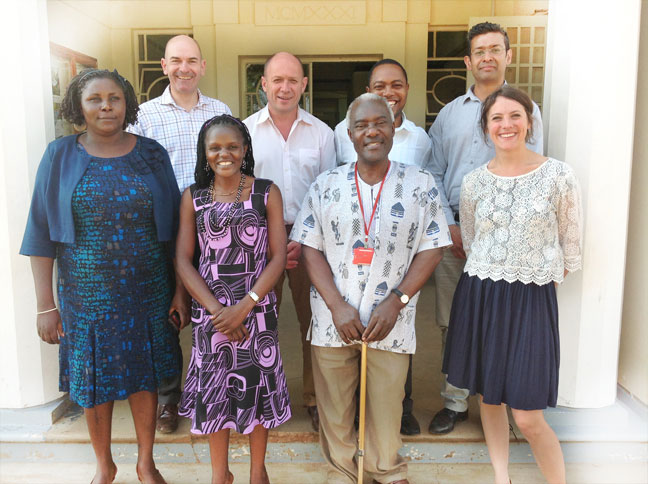Uganda UVRI's Visibility Fostered by Partnership with England PHE and IANPHI Support
With the help of communication mentors from Public Health England, the Uganda Virus Research Institute is working to change misconceptions about its work and highlight efforts such as its involvement in identifying and controlling recent outbreaks of Ebola, Marburg, yellow fever, influenza, polio and measles.

The Uganda Virus Research Institute (UVRI) has spent the past 80 years helping protect and promote the health of the people of Uganda through science, technology and innovation. But most Ugandans still don’t know the core business and contributions of UVRI. Even in Entebbe where UVRI is located, some local residents harbor the myth that the institute releases malaria-infected mosquitoes for research purposes during the peak of breeding seasons.
With the help of communication mentors from Public Health England (PHE), UVRI is working to change such misconceptions and instead highlight efforts such as UVRI’s involvement in identifying and controlling recent outbreaks of Ebola, Marburg, yellow fever, influenza, polio and measles. Indeed, UVRI is a key source of expertise for many of Uganda’s infectious disease detection, prevention and control efforts, including outbreak investigation, disease surveillance, and health product evaluation.
"True to its name, UVRI is a hub for exciting health research on infectious diseases, human resource upgrades through training at undergraduate to post-doctoral levels, infrastructural upgrades, and networking," says UVRI Director Dr. Edward Mbidde.
The goal of the partnership with PHE is to boost UVRI’s visibility and influence among public health professionals, partners, policy makers—even its own departments—as well as the general public both in Uganda and beyond.
A PHE communications team visited UVRI this past spring to conduct an in-depth needs assessment. Based on their recommendations, UVRI’s new overarching communications plan will focus on improving UVRI’s website, developing its intranet and extranet, establishing a social media presence, improving annual reporting, and strengthening media relations. UVRI has recruited communications fellow Jennifer Bakyawa to help oversee those tasks and be part of the effort to establish UVRI as a strong umbrella organization for a myriad of public health organizations.
The PHE communications team also will help UVRI set its objectives in motion and make targeted recommendations based on resources and expertise available at UVRI.
"The PHE team is happy to share its own experiences," says Laurence Knight, southwest region communications manager, noting that the United Kingdom has faced similar communications challenges over the past decade. Most recently, when Public Health England was created by combining several existing public health agencies within the UK, including the UK’s Health Protection Agency and the National Treatment Agency, the new agency had to rethink its own communications strategies and branding.
The PHE-UVRI project was initiated and funded in part by IANPHI as part of IANPHI’s long-term commitment to helping UVRI build capacity. Working together since 2006, UVRI has successfully leveraged IANPHI capacity building grants to attract about $16 million through collaborations with external partners to bolster the public health workforce, build national and regional partnerships for training and research, and upgrade facilities and infrastructure.
"The value of UVRI as a whole is greater than the sum of its parts," says George Miiro, a scientist and medical doctor at UVRI, who perceives improved communications as a means to help harmonize the divisions and programs of UVRI, and showcase its research, outcomes, and impact.
"This was another phenomenal visit by the three communications experts from Public Health England to UVRI, orchestrated by our ever-growing partnership with IANPHI," says Dr. Miiro. "The jointly developed UVRI communications strategy and the new communications fellow Ms. Bakyawa are envisaged as the magical glue to get UVRI scientists and research administrators out of the culture of 'silo' working.
"We are striving to collate and curate the scattered and often unreported research findings and activities of UVRI into potential knowledge translation products to be shared with all our cherished stakeholders so as to contribute to the advancement of policy and programming in the public health sector of Uganda and beyond."
The trip also laid the foundation for a long-term mentoring relationship between UVRI and PHE. "Part of PHE’s mission is to help build public health capacity overseas to enable other countries to comply with the International Health Regulations (IHR)," says Emmeline Buckley, from PHE’s International Office. "By working with UVRI we are helping build public health capacity in Uganda. It is also useful for PHE to build links with UVRI for other projects that may come up in other areas. Working through IANPHI is a good way to make that happen, and we’re looking into working with other countries, too."